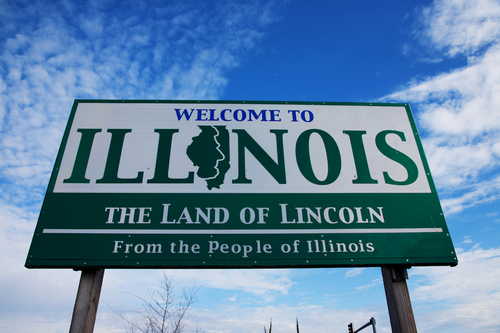The state’s “Blockchain Technology Act”, sponsored by Rep. Keith Wheeler (R), took effect Jan. 1, opening a slew of potential new legal scenarios for blockchain-based contracts. These contracts are now admissible as evidence in court, recognized as a viable alternative to paper-based records and statutorily exempt from local taxation.
With the new year Illinois became the latest state to recognize smart contracts and other blockchain-based records as legal instruments.
“A smart contract, record or signature may not be denied legal effect or enforceability solely because a blockchain was used to create, store or verify the smart contract, record or signature”, the law reads in part.
Illinois joins other U.S. states in recognizing smart contracts in legal settings. Vermont led the charge with its 2016 move to make blockchain records admissible in court. One year later, Arizona passed similar legislation recognizing blockchain signatures.
The Illinois law extends the same legal recognition already enjoyed by paper contracts to blockchain contracts and agreements so that they are recognized as legally binding in the eyes of the state.
It also shields the blockchain industry from local government interference, meaning cities and towns cannot impose taxes and regulations or require licensing or permits on blockchain systems or those who use them.
“The law ensures that businesses and individual community members will not have to navigate a patchwork of local blockchain regulation”, said Alison Mangiero, president of blockchain technology company TQ Tezos and a proponent of the bill.

Its backers in the Illinois State legislature hailed the bill when it was passed as a means of providing companies and businesses with a legal framework for embracing new technologies. Governor J.B. Pritzker signed the measure into law in August.
Mangiero agrees. She said legal certainty and stability will allow firms to focus their efforts on developing new uses for the technology, including facilitating transactions.
Tatyana Ruderman, counsel at InfoLawGroup’s Chicago offices, said the law may well bolster companies looking to utilize blockchain-based records systems. But she said the law’s wording is vague in places, enough so that she predicts it could face a legal challenge.
“The law is likely to be tested in courts by parties who later want to try and invalidate a blockchain transaction, she said.
Ruderman added the Illinois law’s success may be hindered by its borders. Just because Illinois recognizes blockchain and smart contracts doesn’t mean a different state, like neighboring Indiana, will do the same.
“It may not make sense for businesses who operate outside of Illinois to implement blockchain-based contract management only in Illinois and not elsewhere”, she said. “This may be an area where it makes sense for industry to come together and agree on some standards to fill the gaps.”
If You Held Crypto on CoinGather in 2017 the US Government Wants to Give it Back
The United States Department of Justice is seeking the owners of crypto funds that were held by CoinGather – a small crypto exchange that was seized by the Federal Bureau of Investigations, or FBI, in March 2018.
The seizure came months after the exchange had abruptly ceased operating during November 2017, prompting rumors to circulate that the platform had conducted an exit scam.
US Gov seeks victims of CoinGather scam
The U.S. government is looking for individuals who may have a claim to the crypto holdings of the defunct CoinGather exchange.
A warrant shows that the cryptocurrencies currently reside on the Dell PowerEdge Server, serial number JNFHSW1. Neither the value of the crypto held on the server nor the sum that the Justice Department is willing to forfeit has been disclosed.
Individuals seeking to claim cryptocurrencies held on the exchange’s former server have 35 days to contact the Eastern District of Michigan Justice Department.
The relevant parties are instructed to detail their name, address, and date of birth, and detail their CoinGather holdings in the form of signed documentation under penalty of perjury.
CoinGather ceases operating amid all-time highs
Estimated to represent $100,000 in daily trade at the time of the platform’s abrupt end to operations in November 2017, CoinGather was relatively small when it ceased trading.
Posts to Reddit and Bitcointalk during late-2017 show an immediately skeptical response to CoinGather’s silence from the crypto community amid what were then all-time highs of nearly $10,000.
After impacted users claimed to identify the website owner as an individual living in Ohio, they reached out to the FBI at the start of 2018.
On March 15, 2018, the FBI seized CoinGather.com after obtaining a wallet for a probable cause finding.
